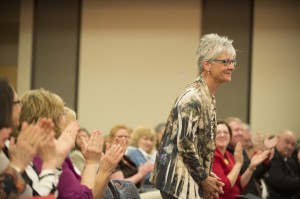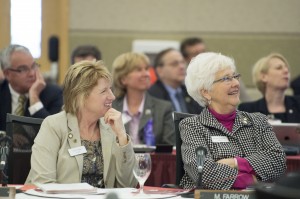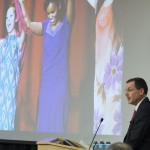
Chancellor Van Galen addresses the Regents
RIVER FALLS, Wis. – The University of Wisconsin System Board of Regents received its first look Thursday at new financial management tools the University will be using to express, explain, and manage its resources.
“Our goal is that you will have greater confidence in how we are managing the University’s finances,” UW System President Ray Cross told the Board.
Among the changes is a shift away from a historical practice of looking at the finances through narrow windows of time, typically one or two years.
“This (narrow view) made it more challenging to capture significant trends, some of which have been harmful,” Cross said. “In the future, we are going to be looking at rolling five- or six-year timeframes. This will allow us to better capture those trends and more accurately evaluate how critical pieces in our budget interact to form the whole.”
Regent President Michael Falbo noted that when Cross took on the job as System president, he had pledged to find ways to better communicate the university’s finances. “We are pleased to see you begin to deliver on that commitment,” Falbo said.
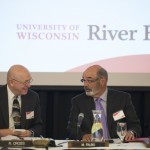
President Cross (left) and Regent President Falbo
Senior Vice President David Miller provided Regents with a report on program revenue balances that are newly broken down by categories developed by the Legislative Audit Bureau: Obligated, Planned, Designated, Reserves, and Undocumented. Additionally, program revenue balances are now broken down by institution using these new categories.
For fiscal year 2013, the total unrestricted program revenue (PR) balances for the System overall were $1.096 billion, Miller said. Three-quarters (75%) of these PR balances are committed funds (including the obligated, planned and reserve categorizes). Of the remaining funds, only 3% — or about $38 million – are flexible funds without specific documented plans. The other 22% (or $245 million) are categorized as designated, meaning they’re held for a purpose related to the original fund source but planned expenditure is not documented.
Including the latest March data, which concludes the third quarter of fiscal year 2014, preliminary projections for the 2014 year-end totals for program revenue balances of restricted and unrestricted funds are $1.256 billion – down from $1.273 billion in fiscal year 2013. The projected unrestricted balance for FY 2014 is $1.05 billion.
- See the PowerPoint, “ ”
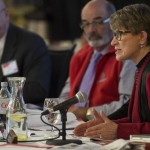
Regent Vice President Millner (right)
Similarly, the projected tuition balance for FY 2014 is $485 million, down from $551 million in FY 2013.
Falbo noted that the 4th quarter typically is heavily weighted toward expenses over revenue.
Regents were also presented with Budget-to-Actual summary data for FY 2014, showing that of the Board-approved $5.997 billion budget, the year-end projection indicates a revenue deficit of $31.4 million and expenditures of $41.1 million above budget – for a projected total net of -$72.5 million. This performance report will be used by UW management and staff as an additional tool for managing resources during the fiscal year.
- See the PowerPoint, “ ”
“I guess you’re getting close to a non-CPA understanding this,” said Regent Margaret Farrow, after a Business & Finance Committee presentation.
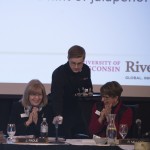
The UW-River Falls Dairy Pilot Plant named a cheese in honor of the Regents’ visit: Reggenti (plural Italian for “regent”).
Preparing for the Board’s vote on the 2014-15 annual budget in June, Regents were briefed on new budget modeling going forward that will use not only the prior year’s budget to develop the new budget, as was done in the past, but also include projected “actuals” for the prior year as well as projected fund balances.
- See the UW System PowerPoint, “ ”
“Our whole purpose is to prepare you and help you feel comfortable with what we’re doing as an organization and to be open about where we are and where we’re going,” Cross said.
“Huge effort is being put into doing this in the best way possible,” Farrow said.
UW-River Falls is on ‘Pathway to Distinction’
Host Chancellor Dean Van Galen led the presentation, “The University of Wisconsin-River Falls: Pursuing a Pathway to Distinction in the St. Croix Valley.”
Van Galen told Regents that the longest standing international study program at UW-River Falls, Quarter/Semester Abroad: Europe, has now reached the 50-year mark.
“In this program, students conduct directed research projects and travel relatively independent in Europe for quarter terms,” explained Van Galen, adding that this strong international focus is one the campus wants to build on. In fact, the University tagline is, “Global. Innovative, Excellence.”
“We aspire to be among the national leaders in internationalization among public comprehensive, master’s level institutions,” Van Galen said. Currently, the proportion of UW-River Falls seniors who have experienced international study is nearly double that of comparable institutions, at 22%.
In addition to expanding global educational programs, UW-River Falls is focusing on “distinctive academic excellence” and stronger partnerships to further differentiate itself in the state and region. Part of this effort is a renewed focus on undergraduate research, scholarship and creative activities.
Business administration, animal science and biology are the three academic programs on campus with the highest enrollments, according to Van Galen. “UW-River Falls, with 135 dairy science majors, is second only to Cornell University,” he said.
UW-River Falls is also committed to “build impactful partnerships in our region and beyond,” he said. Van Galen cited the Hudson Center, which serves adult learners via a part-time MBA and undergraduate programs in business administration. The Center was developed with advice of community leaders, including Hudson Mayor Dean Knudson.
“It’s wonderful to have other people in the same boat as you are,” said Teresa Kosmas, an adult student at the Hudson Center.
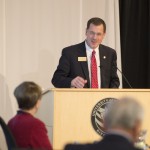
Chancellor Van Galen
Van Galen closed by presenting the Regents with samples of a special edition “Reggenti” cheese, prepared at the Dairy Pilot Plant. “Pretty great tasting intellectual property,” Van Galen said.
Joint Meeting of the Audit Committee and the Business and Finance Committee
State Auditor Joe Chrisman and staff from the Legislative Audit Bureau provided an unmodified audit opinion on the UW System’s Annual Financial Report for Fiscal Year 2012-13.
The Audit Bureau also reviewed two internal controls and fiscal management issues: security relating to UW System’s Human Resource System (HRS) and program revenue balances. The audit noted material weaknesses relating to HRS access and the program change process. UW System agreed with the findings, and is taking corrective action.
Business and Finance Committee
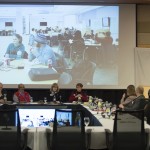
Riverview Ballroom in the University Center, UW-River Falls
The Committee:
- Approved a change in the bylaws of the University Book Store in Madison, moving from its current structure, which was established as a Trust Indenture, to a more common non-stock corporation structure as described in Chapter 181 of the Wisconsin Statutes;
- Heard highlights from the annual endowment peer benchmarking report, noting annualized returns for UW Trust Funds were roughly on par with peers in the one-, three-, and five-year periods ending June 30, 2013 while top quartile performance was again achieved in the 10-year period comparison;
- See the PowerPoint, “ ”
- Tabled voting of non-Routine Proxy Proposal due to time constraints.
Education Committee
Annual Program Planning and Review Reports: Associate Vice President Stephen Kolison presented the 2012-13 Program Planning and Review Reports, which summarize activity related to the UW System program array, including the pre-authorization for planning, authorization, implementation, review, elimination, and suspension of academic programs across the UW System.
The wide array of degree program choices at UW System campuses has expanded slightly over the past five years. Currently, there are 1,214 degrees UW students may pursue.
“We’ve had a net gain of 32 new degree programs over five years,” said Stephen Kolison, Jr., Associate Vice President for Academic, Faculty and Global Programs. He said during that time, 80 degrees were added and 48 were removed.
Bachelor’s degree programs were the most common, numbering 726. Master’s programs followed with 336.
Kolison noted that certain degrees, such as accounting, are popular and can be pursued on virtually all campuses. Psychology is the lone major available on every campus. Nevertheless, Kolison said “the level of duplication is quite small.” In fact, the majority (58%) of undergraduate degree programs are offered at just one institution.
Kolison reminded the Board of Regents that one of its most important responsibilities is to “ensure that the citizens of the state of Wisconsin are provided with a high-quality array of academic programs while minimizing unnecessary duplication.”
In other business, the Committee:
- Heard a presentation from UW-River Falls Provost Fernando Delgado, “Nontraditional Students – Building Partnerships at UW-River Falls”;
- Approved a B.S. in Physical Education at UW-Madison;
- Approved an M.S. in Computer Science at UW-River Falls;
- Approved a B.S. in Elementary Education at UW-Parkside;
- Approved the annual Request to Trustees of the William F. Vilas Trust Estate for support of scholarships, fellowships, professorships, and special programs in arts and humanities, social sciences, and music;
- Approved several charter school requests, including a 4-year renewal of Urban Day School (with review after two years), a new authorization of the Milwaukee College Preparatory School-North Campus, and authorization of three Seeds of Health Schools, Inc., schools under one contract, to include Seeds of Health Elementary School, Tenor High School, and Veritas High School.
Research, Economic Development and Innovation Committee
Sajan, an international translation company based in River Falls, has hired 10 full-time UW-RF students since the company was founded in 1997. CEO Shannon Zimmerman told Regents that his company has grown rapidly over the years and now has offices on “nearly every continent.”
He describes his relationship with the campus as mutually beneficial. The students need work experience and it’s not easy for his company to find software engineering talent because it’s in such great demand.
“I try to hire the best and brightest (UWRF students) before Minneapolis gets to them,” he said. But Zimmerman looks for more than just technology specialists. “Marketers and people with good business skills” are among those students he is interested in, too.
At first, Zimmerman said his colleagues were skeptical that students could add value for the company, given their lack of experience. But the company founder said inexperience can also be an asset. “Students don’t know what is impossible and will work hard to figure out problems,” he said.
He said there is no question that interns and students eventually hired for full-time positions have helped his company prosper, and he credits UW-RF faculty for facilitating the relationship.
“I can’t be more grateful to this university,” said Zimmerman.
LEAP Campaign: Student Regent Tracy Hribar led a discussion regarding the UW System’s partnership with the American Association of Colleges and Universities and its LEAP Campaign (Liberal Education and America’s Promise). LEAP Wisconsin works to ensure that UW students are provided with the essential learning tools and skills they need to be successful in their work, civic, and personal lives.
“It’s easy to make jokes about what art, political science or English majors are going to do with their degrees. They do just fine. But we must support them,” Hribar said.
Hribar, who is the business manager for James Hribar Trucking, a family business in Raymond, Wis., said she is the first Wisconsin business owner to sign on to AAC&U’s Employer-Educator Compact, and she urged others to follow suit. “This is the way to link UW with the business community,” she said.
Regent President Mike Falbo called the findings of a Gallup/Lumina Foundation poll that 90% of provosts think American colleges and universities are preparing graduates to succeed in the workforce while only 14% of the American public share that opinion “kind of staggering.”
UW-River Falls Presentation: UW-River Falls: Chancellor Dean Van Galen led a presentation on UW-River Falls’ undergraduate research, economic development, and business outreach efforts.
- See the UW-River Falls Powerpoint: “ ”
In other business, the Committee:
- Heard an update from UW-La Crosse on their Economic Development Incentive Grant project that focuses on statistical consulting services with businesses.
- See the Powerpoint, “ ”
- Heard a report by Associate Vice President David Brukardt on UW System’s ongoing collaboration with the Wisconsin Economic Development Corporation.
Capital Planning and Budget Committee
The Committee heard a UW-River Falls presentation on the status of their major projects followed by the UW-River Falls Farms Master Plan.
- See the UW-River Falls PowerPoint, “ “
In other business, the Committee:
- Heard a report from Associate Vice President Alex Roe describing the process of master planning and an explanation of the general timeline of major building projects;
- Approved UW Colleges’ request for authority to permanently release approximately 3.0 acres from the UW-Fond du Lac lease back to Fond du Lac County so that the County may enter into a long-term ground lease with a private developer to construct and operate a student housing facility for UW-Fond du Lac students;
- Approved UW-Eau Claire’s request for approval to amend the previously approved lease of space in The Priory to (1) renovate space in buildings A, B, and portions of building C that are not occupied by the Children’s Center;
- Approved UW System’s request for approval of seven All Agency Maintenance and Repair projects on four campuses with an estimated total cost of $8M that include exterior building repairs, space remodeling, and utility improvements;
- Approved UW-Whitewater’s request for authority to increase the budget of the West Campus Residence Hall Upgrade project by $2M Program Revenue-Cash. The lowest bid for this project was almost $2M more than the original project budget.
Photo credit: UW-River Falls photographer Kathy Helgeson
See more photos from the meeting
The University of Wisconsin System Board of Regents will resume its meeting
at 9 a.m., April 11, 2014, at UW-River Falls.
Related: April 11 (day 2) news summary

